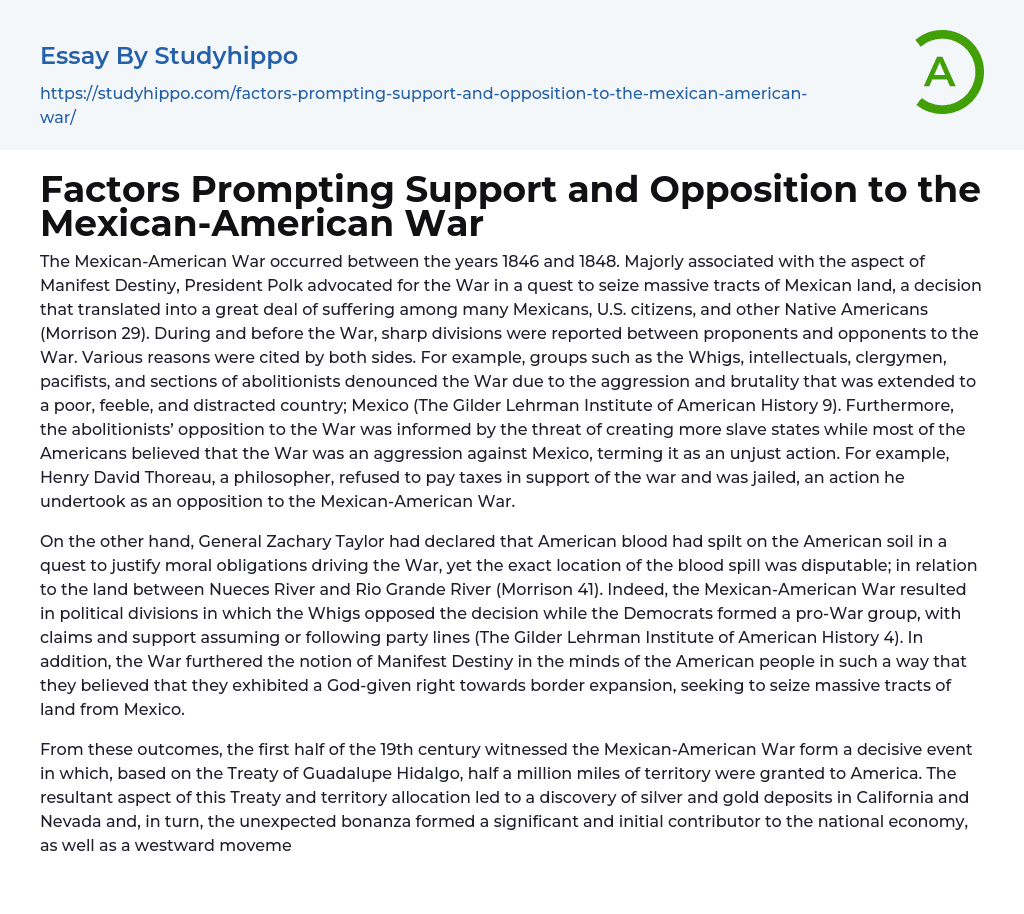

Factors Prompting Support and Opposition to the Mexican-American War Essay Example
The Mexican-American War occurred between the years 1846 and 1848. Majorly associated with the aspect of Manifest Destiny, President Polk advocated for the War in a quest to seize massive tracts of Mexican land, a decision that translated into a great deal of suffering among many Mexicans, U.S. citizens, and other Native Americans (Morrison 29). During and before the War, sharp divisions were reported between proponents and opponents to the War. Various reasons were cited by both sides. For example, groups such as the Whigs, intellectuals, clergymen, pacifists, and sections of abolitionists denounced the War due to the aggression and brutality that was extended to a poor, feeble, and distracted country; Mexico (The Gilder Lehrman Institute of American History 9). Furthermore, the abolitionists’ opposition to the War was informed by the threat of creati
...ng more slave states while most of the Americans believed that the War was an aggression against Mexico, terming it as an unjust action. For example, Henry David Thoreau, a philosopher, refused to pay taxes in support of the war and was jailed, an action he undertook as an opposition to the Mexican-American War.
On the other hand, General Zachary Taylor had declared that American blood had spilt on the American soil in a quest to justify moral obligations driving the War, yet the exact location of the blood spill was disputable; in relation to the land between Nueces River and Rio Grande River (Morrison 41). Indeed, the Mexican-American War resulted in political divisions in which the Whigs opposed the decision while the Democrats formed a pro-War group, with claims and support assuming or following party lines (The Gilder Lehrman Institute of America
History 4). In addition, the War furthered the notion of Manifest Destiny in the minds of the American people in such a way that they believed that they exhibited a God-given right towards border expansion, seeking to seize massive tracts of land from Mexico.
From these outcomes, the first half of the 19th century witnessed the Mexican-American War form a decisive event in which, based on the Treaty of Guadalupe Hidalgo, half a million miles of territory were granted to America. The resultant aspect of this Treaty and territory allocation led to a discovery of silver and gold deposits in California and Nevada and, in turn, the unexpected bonanza formed a significant and initial contributor to the national economy, as well as a westward movement. Thus, the new territory implied that political power would be exhibited by America and that fine ports would be offered along the Pacific coast (Morrison 39). However, this territory expansion upset an imbalance between slave states and free states, an adversity that culminated in to the American Civil War. Thus, the Mexican-American War is attributable for the resultant divisions in America because slave owners and abolitionists emerged; a trend that accounted for a power imbalance between slave states and free states. Therefore, the need to admit more states to its union prompted America to enter the War and conquer sections of interest in Mexico but opposing groups feared a potential upset to a delicate power balance. Overall, the textbook, the documentary, and primary documents addressing the issue of the Mexican-American War exhibit a commonality in such a way that aspects of slavery, power balance, and the attribute of Manifest Destiny are
affirmed as critical debates surrounding the War.
On the other hand, the documentary remains detailed while primary sources and the textbook tend to exhibit gaps in terms of event chronology, focusing on major events such as debates between the Democrats and the Whigs. Given that the War led to America’s acquisition of additional territories and border expansions that included California, an absence of the War would imply that the latter region falls outside the U.S. borders. The eventuality would have been a significant imbalance in the region’s state of economic stability, given the significant extent to which California has proved to be resourceful to the U.S. As such, it can be inferred that an absence of the War would compromise the current state of social and economic benefits that the U.S. enjoys; having secured California. To allow Texas (a Mexican province by then) to act as a buffer, the Mexican government sponsored American migration to the region. Had this idea been halted, it is projected that a call for an independent Texas was likely because this call came after sections of Mexicans and Americans (having settled in the province) ended up revolting against the Mexican government that sponsored them to migrate to the area. A resultant question that is worth examining is what was the origin of Manifest Destiny, a central factor in the Mexican-American War?
Works Cited
- Morrison, Michael A. New Territory versus No Territory: The Whig Party and the Politics of Western Expansion, 1846-1848. Western Historical Quarterly, 23.1(1992), 25-51
- The Gilder Lehrman Institute of American History. Congressman Joshua Giddings, Debate on the Mexican War, House of Representatives, Washington. May 13, 1846. Web. Retrieved on December
5, 2016 from https://www.gilderlehrman.org/sites/default/files/inline-pdfs/Lesson%202%20Giddings%20Speech%20abridged.pdf
- American Civil War essays
- Atomic Bomb essays
- Attack essays
- Cold War essays
- Crimean War essays
- Diplomacy essays
- Emilio Aguinaldo essays
- Emperor essays
- Hitler essays
- Iraq War essays
- Korean War essays
- Mexican American War essays
- Nazism essays
- Nuclear Weapon essays
- Philippine Revolution essays
- Revolutionary War essays
- Rwanda essays
- The Spanish American War essays
- Trench Warfare essays
- Tribe essays
- Vietnam War essays
- War of 1812 essays
- Western Front essays
- World War I essays
- World War Ii essays



